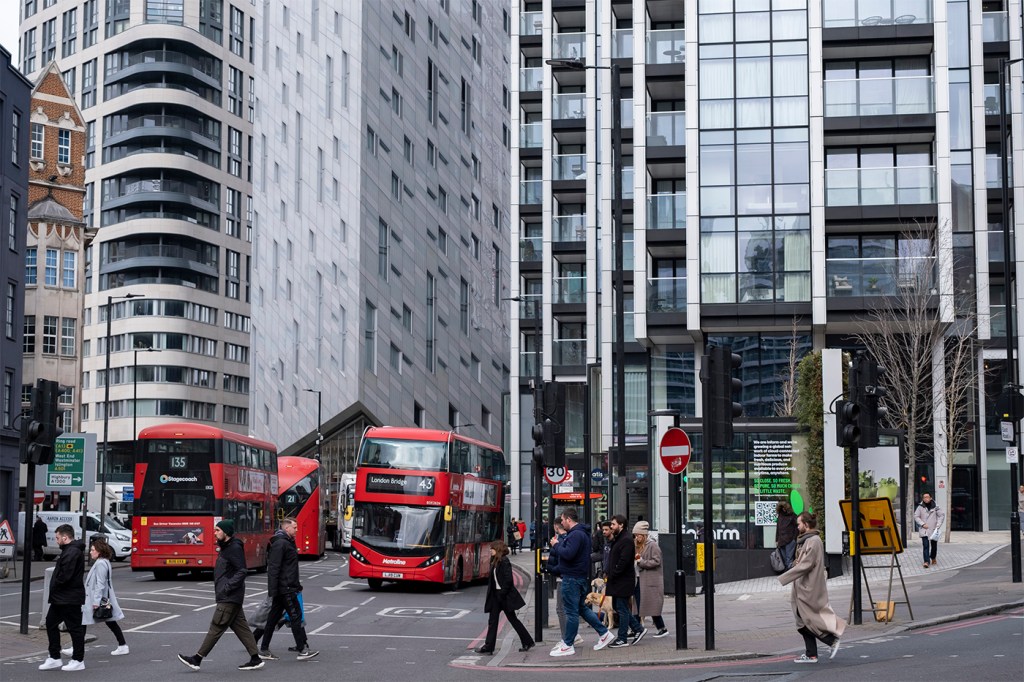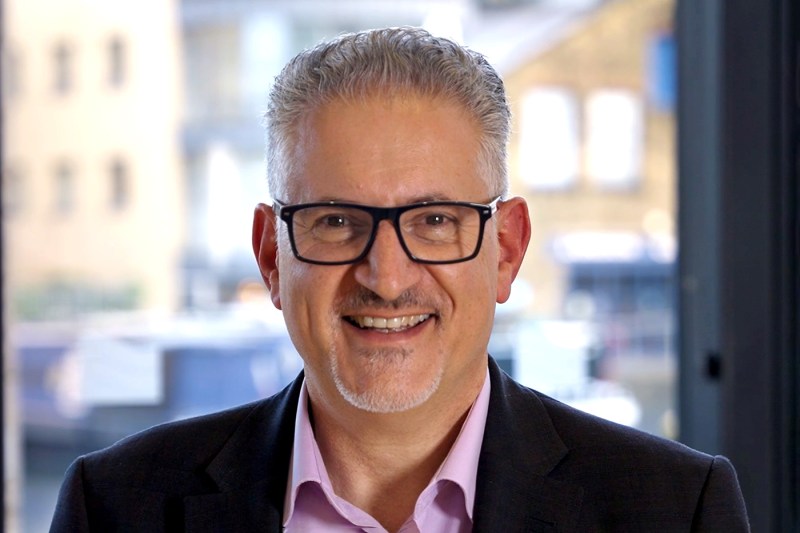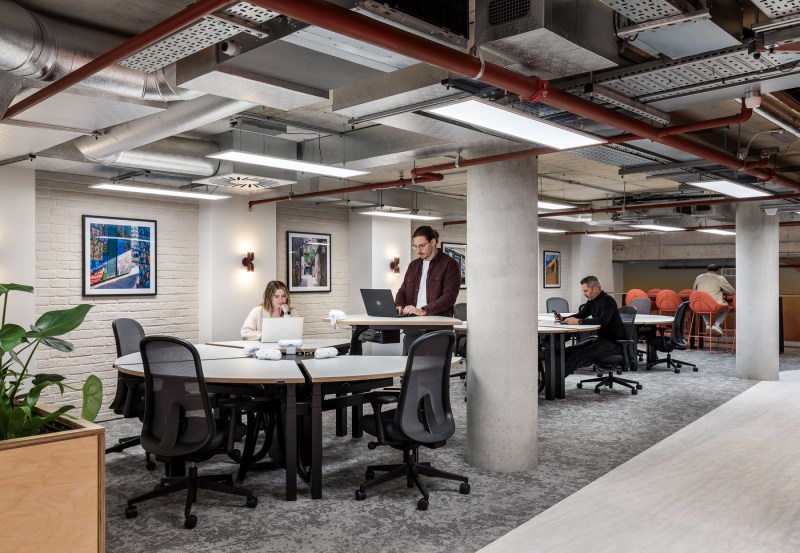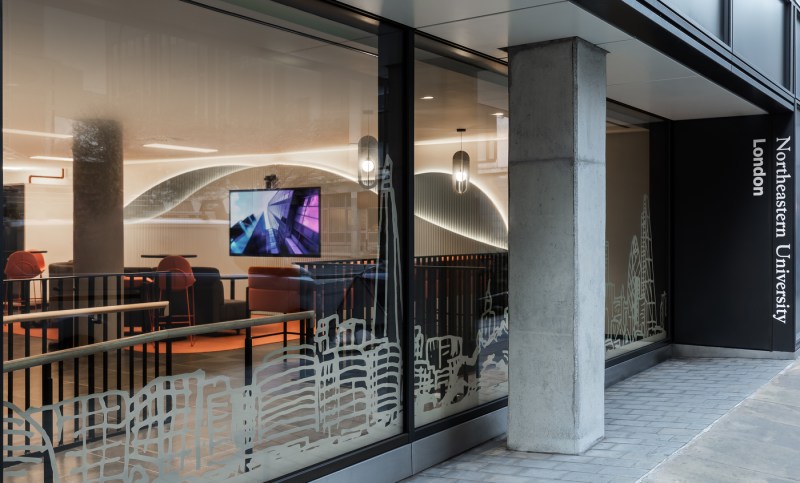How the man behind the
UK’s answer to Silicon Valley found
a home at Northeastern’s
London startup hub
Eric van der Kleij accelerated Britain’s digital boom while Downing Street’s tech guru. Now he wants to be at the forefront of the next decade of growth.

LONDON — Eric van der Kleij was impressed with what he was hearing.
David Cameron, a new young-gun prime minister elected only six months beforehand, was announcing his intention for Britain to establish a technology hub in London to rival the success seen in California’s Silicon Valley.
Cameron told the entrepreneur and others in that audience in November 2010 that there was “no reason why” the San Francisco Bay area should be “so predominant” as he set out a vision to “help make east London one of the world’s great technology centers.”
Van der Kleij “loved the boldness” of what he says started out as an “audacious” pitch to take Silicon Valley head-on.
Within a year, van der Kleij would go from nodding along in enthusiasm to being appointed No. 10 Downing St.’s tech guru and put in charge of making the prime minister’s vision a reality.

Fast forward to 2024 and van der Kleij is now a co-founder and partner of EdenBase, a technology investment fund based at Northeastern University’s London startup hub.
Van der Kleij’s business partners are Arian Alikhani and Daniel Doll-Steinberg — author of “Unsupervised: Navigating and Influencing a World Controlled by Powerful New Technologies,” hailed as one of 2023’s best books by Bloomberg.
Together, they opted against hiring office space in the trendy Shoreditch neighborhood or in a glass skyscraper in the city of London, the traditional finance center of the capital.
Instead, they chose to set up shop at Northeastern.
Home to 13 startups
The university’s hub opened in February and is home to 13 startups that have use of a boardroom, meeting rooms, private pods and two events spaces, including one that contains part of London’s surviving Roman wall.
Those who apply and are selected to be based at the office in Crosswall, just off America Square, are given discounted rates on desk space but in return agree to work with the university and its students, including offering mentoring and other opportunities.
“One of the reasons we are here at Northeastern is because there is going to be a massive talent war for the biggest, most important and most relevant skills in fueling the next decade of growth. And so we, as a fund, want to be as close as we can to where the talent emerges,” van der Kleij says.
Situated almost a mile-and-a-half from Old Street in east London — now dubbed the Silicon Roundabout due to its dense cluster of tech businesses — where he helped to accelerate Britain’s tech revolution, van der Kleij is once again positioned to be a key player in unlocking the sector’s potential.
EdenBase is a U.K.-based early-stage venture capital fund that invests in companies it regards as having the potential to become a “game changer” in the world of emerging technologies, including artificial intelligence, machine learning and quantum computing.
Finding businesses to invest in is not the issue, van der Kleij states — it is sourcing the workforce to fuel their growth. “The frontier that really matters is access to talent,” he explains, as he sets out EdenBase’s relationship with Northeastern.


TransformBase to take place June 27
He highlights how EdenBase posts opportunities on the university’s jobs platform, provides feedback on student business pitches and has decided to move its annual flagship event, TransformBase, to Northeastern’s London campus this year, with the event scheduled to take place on Thursday, June 27.
“We want to be very closely woven into the very fabric of what is being built here,” says van der Kleij, “and to give the students the most amazing opportunities.
“Because the very lifeblood of future growth is ensuring that they get the best experience and the best skills.
“So the university can train them on skills, and we can give them amazing opportunities.”
Van der Kleij — a self-professed “barbecue nut” who loves to have his family, which includes three daughters and six grandchildren, around for a feast when he isn’t working — says the decision to be based at the hub revolved around a calculation that the companies with access to the best talent are likely to reap the rewards when the next tech revolution rolls through.
“The winners in the next decade of growth will be those that figure out how to responsibly invest in AI and frontier technology-powered businesses and enterprises,” he says.
“These technologies are going to solve some of the world’s biggest problems, in our opinion as a fund.
“We want to find the companies that are going to do that and we want to invest in them,” says van der Kleij.
Featured Posts
Uniting individuals, institutions and corporates
EdenBase was born out of an idea that bloomed during COVID-19 lockdowns, with the partners wanting to unite high net worth individuals, institutions and corporates with technological startups that have strong potential for growth. It became regulated and closed its first deal in late 2023.
Van der Kleij, an imposing South African-born businessman who has lived in the U.K. since he was 14, has been at the forefront of a tech boom before and was a central figure in ensuring Britain could become a base for some of the globe’s largest tech firms.
British outfits such as online challenger bank Starling and food delivery app Deliveroo count themselves among, according to private company database Beauhurst, the U.K.’s 43 active so-called unicorns — startups with a valuation of at least $1 billion (£800m).
In 2008, the term Silicon Roundabout was initially coined as a joke — a reference to the contrast between the sunny Golden State home of many of the big U.S. tech giants and the British equivalent, which effectively amounted to a few digital firms based near Old Street, a dreary, traffic-clogged circular junction in east London.
But by the time van der Kleij was roped in by Downing Street in 2011 to assist with delivering on the prime minister’s tech vision, the situation looked very different. Cameron’s speech a year earlier had coincided with an announcement that Google, Facebook and Intel would be among the major digital companies investing close to the roundabout.
Van der Kleij’s experience at having successfully set up his own company, Adeptra, a credit card fraud alert system, in 2000 (it was eventually sold for more than £100 million to U.S. analytics business FICO) led to him becoming involved with a government program assisting entrepreneurs to set up businesses in Britain.
Creating U.K.’s answer to Silicon Valley
While in that role, he ended up assisting Downing Street to devise the strategy for creating the U.K.’s answer to Silicon Valley before being charged with carrying out the concept that became known as “Tech City.”
In 2011, Tech City estimated that 200 digital media firms were occupying the 1.5-mile London cluster first earmarked by ministers for growth. A year later, Wired magazine ran the sums and reckoned that the number had swelled to 5,000.
Van der Kleij held the role of chief executive of the Tech City Investment Organisation for two years before choosing to bow out.
Looking back on an “amazing” 10 years of growth for the tech sector, he remains proud of what his work helped achieve, with Facebook, Google, Microsoft, Adobe and Last.fm all retaining a presence in east London and his strategy later going on to be transformed into a national vision called Tech Nation.
He says that period of focused investment and attention “transformed the U.K. as a destination for tech.”
Coming from an international background — he was born to an Iranian mother and a Dutch father — van der Kleij says Britain’s tech industry has the “right ingredients” to prosper, including “great universities” supplying an “amazing army of talented people,” a “welcoming culture” and ministerial-backing.











